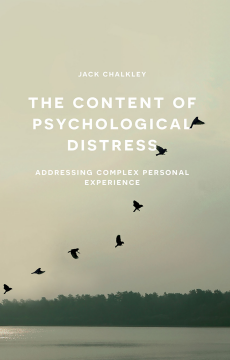
Additional Information
Book Details
Abstract
The Content of Psychological Distress makes the case for focusing psychological attention on the content of people's distressing experience. The growing demand for counselling and therapy in difficult financial times has created pressure to keep work short and highly structured. This has increased reliance on set procedures and categories at the expense of the personal and specific.
The book looks at the rationale for, and practical steps involved in, taking individuals' accounts of their concerns as a starting point. It treats these as a foundation on which approaches of various kinds can be laid. It considers the impact of doing so on building relationships and improving the accuracy and richness of the work undertaken. The book is illustrated with examples from general mental health and particular psychological therapies, as well as with applications to pain, intensive care, cancer, paediatrics and forensic learning difficulties.
This is a timely and important book for students, trainees and practitioners that contains reflections on the historical and philosophical background to the subject. It relates what is argued to a range of existing ideas and approaches concerned with making psychological work ethical and patient-centred.
This book offers a critical approach to 'off the shelf' diagnoses in mental health and focuses on the content of the client. It is an exciting and important read for anyone working in the field.
Jack Chalkley studied history at Cambridge and psychology at Birkbeck University of London and the Institute of Psychiatry. He has worked as an NHS clinical psychologist for over 30 years in psychiatric rehabilitation, community mental health and specialist psychological therapies. He lived previously in France, and took from that an interest in continental philosophy, which provided much of the underpinning that shaped his approach to psychological assessment. He has taught on a number of university training courses and served on the academic boards of two of them.
'It is rare to find a book about psychological distress that is elegant, scholarly, witty, personal and professional at once - and that is also a "great read". Jack Chalkley, drawing on a lifetime of experience as a clinical psychologist, provides just that. The Content of Psychological Distress is whimsical and rigorous, scientific and emotional, and a powerful and ethical incitement that will guide clinicians into humane, helpful practices. It is, in short, a book full of wisdom.' Stephen Frosh, Professor, Department of Psychosocial Studies, Birkbeck, University of London, UK
'This book offers a well-argued case for focusing on the client and their distress in context and the content of their concerns as the heart of what is important about therapy. This is a welcome and important breath of fresh air.' Barbara Douglas, Chartered and Registered Counselling Psychologist
Table of Contents
| Section Title | Page | Action | Price |
|---|---|---|---|
| Cover | cover | ||
| Contents | vii | ||
| List of Boxes and Tables | ix | ||
| Preface | xi | ||
| Acknowledgements | xiv | ||
| Introduction | 1 | ||
| 1 Capturing Content | 6 | ||
| Psychological concerns and their definition | 6 | ||
| Phenomenology and scientific method | 10 | ||
| Embracing patients’ personal experience | 14 | ||
| 2 Better Assessment | 20 | ||
| Shapiro’s search for precision, accuracy and relevance | 21 | ||
| “Realistic dependent variables” | 28 | ||
| Content, constructs and the “wedge” | 33 | ||
| Hesitant steps towards a concept of content | 36 | ||
| 3 Data: Creating, Collecting and Reviewing | 40 | ||
| The Traveller from Altruria | 40 | ||
| Sampling a person’s concerns | 46 | ||
| Constructing and administering personal questionnaires | 52 | ||
| Reviewing outcomes | 60 | ||
| 4 Psychological Concerns | 65 | ||
| Help in building a relationship | 66 | ||
| Description in ordinary language | 67 | ||
| Expression as well as description | 70 | ||
| A whole set to take account of | 73 | ||
| Material for reflection | 76 | ||
| 5 General Work | 84 | ||
| The distinction between general and special work | 85 | ||
| Nine named pieces of general work | 86 | ||
| Who does general work? | 106 | ||
| 6 Framework for Psychological Therapies | 108 | ||
| Concerns and referral for psychological therapy | 109 | ||
| Concerns and the course of psychological therapy | 113 | ||
| Psychological therapies as special work | 120 | ||
| 7 Hospital and Community | 124 | ||
| Pain | 124 | ||
| The Intensive Care Unit | 127 | ||
| Cancer and palliative care | 128 | ||
| “Failure to thrive” (poor weight gain in the very young) | 132 | ||
| Forensic learning disabilities | 137 | ||
| 8 Ideas: From Practice to Philosophy | 141 | ||
| Assessing and relating | 142 | ||
| Personal content or personal constructs? | 146 | ||
| Words before numbers | 153 | ||
| Heidegger not Jaspers! | 158 | ||
| 9 The Significance of Content | 168 | ||
| The significance for assessment | 168 | ||
| The significance for counsellors and clinicians | 169 | ||
| The significance for evaluation and accountability | 177 | ||
| The significance for psychology | 179 | ||
| References | 185 | ||
| Index | 194 |
